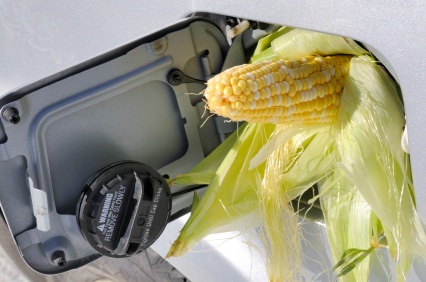 Sen. Bernie Sanders (I-Vt.) delivered a pretty good rant Friday against the Obama/GOP tax compromise. In his eight-hour quasi-filibuster, he highlighted the stupidity and injustice on doling out tax breaks to the wealthy when what the nation needs instead is a big dose of job-creating green-infrastructure spending.
Sen. Bernie Sanders (I-Vt.) delivered a pretty good rant Friday against the Obama/GOP tax compromise. In his eight-hour quasi-filibuster, he highlighted the stupidity and injustice on doling out tax breaks to the wealthy when what the nation needs instead is a big dose of job-creating green-infrastructure spending.
But Bernie missed a spot. Deep in the shadows of the sausage machine, his Congressional colleagues managed to drop in a goodie for an industry that deserves no more goodies: industrial corn processing.
The latest version of the compromise, which is expected to, pass this week, would deliver a one-year extension of a tax break for ethanol use that costs the public about $5 billion per year.
The tax break is absurd. It adds to farmers’ incentives to plant as much corn as possible and goose up yields by dumping on fertilizer. As such, it helps underwrite the Gulf of Mexico’s gigantic annual dead zone — yet more pressure on a vital ecosystem also being trashed by Big Oil. All this, for a fuel that likely does nothing to curb greenhouse gas emissions.
Moreover, the tax break only reinforces farmers’ plant-all-you-can incentives. The 2007 Energy Act already has rules in place that mandate that gasoline producers mix large and increasing amounts of biofuel into the gas supply. The tax break essentially pays them, at a rate of 45 cents per gallon, to do what they’re already forced to do by law.
Why is the corn lobby so adamantly committed to defending the tax break? I suspect they count on this little goodie — again, worth $5 billion per year — to placate the oil industry from rebelling against the mandates and demanding their repeal.
Now, things could have been worse. The corn lobby had demanded a five-year extension of the tax break, but got only a single year. That’s great, but I’m not convinced it will be allowed to expire at the end of 2011. Think the Democrats will be eager to enrage the corn lobby just a year before the 2012 election?
Indeed, King Corn and his Congressional champions are celebrating a job well done. Rep. Collin Peterson (D-Minn.), the top-ranking Democrat on the House ag committee, singled out acting White House Chief of Staff Pete Rouse for special praise. Rouse has been a reliable defender of the corn industry’s interests since his days running former South Dakota Sen. Tom Daschle’s office. According to Peterson, Rouse is now doing King Corn’s bidding in the White House.
“Pete deserves credit for this. Thank God we’ve got him over there,” Peterson, told the website Agriculture.com Friday. “Pete knows this stuff. He knows all the issues and the politics. We couldn’t have anybody better over there [at the White House].”
That assessment adds to my suspicion that the tax break will creep on well past its one-year extension.
Meanwhile, as ethanol interests celebrated their $5 billion victory and plotted their strategy for extending it, Obama signed the Healthy, Hunger-Free Kids Act into law. The act increases finding for school lunch by $450 million per year over 10 years — which amounts to 6 extra cents per kid, per day. Even with the increase, school cafeterias have less than a dollar a day to spend on each kid’s lunch ingredients.
Advocates for a robust public school program, including me and Grist’s tireless school-food chronicler Ed Bruske, had pushed for a much larger increase. We were assured that 6 cents a day was all that was possible in the “current fiscal environment.” Indeed, to finance the increase, the new law subtracts an equal amount of money from EBT (food stamp) programs.
King Corn’s latest triumph — $5 billion annually, versus $450 million in new school-food spending — proves that where there’s political will, there’s a way. Michelle Obama has been a great advocate for school lunches. At the lunch bill’s signing ceremony, the president quipped “Had I not been able to get this bill passed, I would be sleeping on the couch.”
If only the first lady had been able to wring as generous a deal for school kids out of him as his chief of staff managed to get for King Corn. Indeed, for the price tag of one year’s gift to ethanol — $5 billion — we could have more than doubled the the annual increase in lunch spending.



